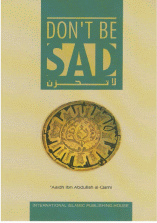Don't be Sad

The reality of this life
One will be happy to the degree that one remembers Allah and recites His Book. And after considering this principle, one may estimate his worth in this world and in the Hereafter.
(And were it not that all mankind would have become of one community [all disbelievers, desiring worldly life only], We would have provided for those who disbelieve in the Most Beneficent [Allah], silver roofs for their houses, and elevators [and stair-ways, etc. of silver] whereby they ascend. And for their houses, doors (of silver), and thrones [of silver] on which they could recline, and adornments of gold. Yet all this [i.e. the roofs, doors, stairs, elevators, thrones etc. of their houses] would have been nothing but an enjoyment of this world. And the Hereafter with your Lord is only for the pious and righteous persons who fear Allah much.) (Qur’an 43: 33-35)
These verses proclaim in clear terms the temporary, therefore insignificant, worth of material possessions and social status.
We should realize that this life is not the yardstick of success when we see that the disbeliever often lives a life of opulence while the believer is often precluded from many worldly pleasures, a phenomenon that merely indicates the paltry value of this world.
While giving a sermon on a Friday, ‘Utbah ibn Ghazwan (may Allah be pleased with him), a well-known Companion of the Prophet (bpuh), was reminiscing out loud about what the days were like when he lived with the Prophet (bpuh). ‘Utbah would fight with him in the way of Allah, and to avoid starvation, he would eat with him the leaves of a tree. Yet he remembered those days to be the happiest of his life. Then he recalled how he departed from the Prophet (bpuh), becoming a governor of a province. And despite this rise in worldly status, he felt wonder at how much lower the true quality of life became after the death of the Prophet (bpuh).
After the death of the Prophet (bpuh), Sa’ad ibn Abi Waqqaas (may Allah be pleased with him) felt bewildered and confused when he became governor of Kufah. During the Prophet’s lifetime, he too would eat tree leaves or the skin of a carcass. He could not bear the castles of his new life after having tasted the pleasure of his old one in the company of the Prophet (bpuh).
(And indeed the Hereafter is better for you than the present (life of this world).) (Qur’an 93: 4)
Therefore there is a secret to guide you in this life ---- and that is to know the triviality of this world.
(Do they think that we enlarge them in wealth and children, We hasten unto them with good things [in this worldly life so that they will have no share of good things in the Hereafter]? Nay, but they perceive not) (Qur’an 23: 55-56)
When he entered the house of the Prophet (Blessings and Peace be upon him), ‘Umar (may Allah be pleased with him) saw marks on the Prophet’s side, which resulted from always lying down on straw, and he also noticed the bareness of the room. His eyes swelled with tears after seeing such a moving sight. The Messenger of Allah (bpuh), the example and leader of all, in such a situation! It was too much for him.
And they say: ‘Why does this Messenger (Muhammad) eat food, and walk about in the markets [like ourselves].) (Qur’an 25: 7)
He said, ‘You know, O’ Messenger of Allah, of the lifestyle of Khosrau and Caesar? The Prophet (bpuh) replied:
"O’ son of Khattab, are you in doubt. Are you not pleased that for us is the Hereafter and for them is this world."
lt is a just balance and a fair distribution. So let them find their happiness in dollars, gold, silver, mansions, and cars if they can. Verily, by Allah, they will never find it in those things.
Whosoever desires the life of the world and its glitter; to them we shall pay in full [the wages of] their deeds therein, and they will have no diminution therein. They are those for whom there is nothing in the Hereafter but Fire; and vain are the deeds they did therein. And of no effect is that which they used to doll (Qur’an 11: 15-16)
